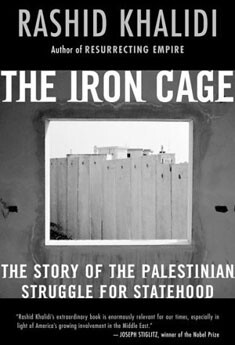The Economist 25 November 2006

The Iron Cage: The Story of the Palestinian Struggle for Statehood By Rashid Khalidi, Beacon; 352 pages; $24.95
One Country: A Bold Proposal to End the Israeli-Palestinian Impasse By Ali Abunimah, Metropolitan Books; 227 pages; $23
THERE was no such thing as a Palestinian people, the late Golda Meir famously said when, as Israel’s prime minister in 1969, she justified their uprooting. She had a point, of sorts. Though the Palestinians were at least as highly developed a people as their fellow Arab members of the Ottoman empire, their claim to independent existence after the collapse of that empire in 1917 was largely airbrushed out of history. Rashid Khalidi, a New York-born Palestinian-American who holds the Edward Said chair in Arab studies at Columbia University, looks for the reason why.
Palestine—present-day Israel, the West Bank and Gaza—had, like Syria, Lebanon and Jordan, been part of Greater Syria, for three centuries under Ottoman control. Unlike them, the Palestinians failed after the first world war to turn the mandatory regimes created by the League of Nations into eventual independence. Mr Khalidi offers two explanations, the British, not unexpectedly, being the villain of both.


Britain crafted the Palestinian mandate into an “iron cage”, a cage from which, Mr Khalidi argues, the Palestinians have never succeeded in escaping. The mandate committed the League to Britain’s wartime promise to establish a “national home” for the Jewish people (at that time about 10% of the population), but made no reference to Arab Palestinian rights to self-determination. Indeed, he writes, the document did not even refer to Arab Palestinians by name but as non- Jews or natives or some such. The long process of subjugation, of fighting to survive as a people, had begun.
Second, the British authorities firmly discouraged the setting up of any sort of representative political structure or leadership, preferring to deal with traditional “notables” or with religious institutions created for the purpose. The notables, writes Mr Khalidi, wanted to liberate their country but, until too late, “resorted to ineffectual beseeching of British government ministers”. Eventually, in 1936, the territory exploded in armed revolt which, after three years, was bloodily suppressed.
Then, at last, on the eve of the second world war, came a British promise of independence in ten years—conditional on Jewish approval. The condition amounted to a veto, but, even so, it would have been clever of the Palestinian leaders to have accepted. Instead the Palestinians, for the first time but not alas for the last, said no to an imperfect offer. Then came the Holocaust, the establishment of Israel, the collapse and scattering of Palestinian society, the frustrating search for a two-state compromise. Now, says Mr Khalidi, all that remains of Arab Palestine is a “patchwork of open-air prison camps”.
An escape from these prisons, to something other than semi-free statelets, is suggested by Ali Abunimah, a Palestinian-American, who created and edits the Electronic Intifada website. But it is an escape to Utopia: a single state of Israel/Palestine where lion and lamb nuzzle down together. Impossible, probably. On the other hand, argues Mr Abunimah, if South Africa could break out of seemingly impossible conflict to find peace and reconciliation, why not Israel?
Some 5m Jews and some 5m Arabs, including Israel’s sizeable Arab minority, confront each other in land that is controlled, directly or indirectly, by Israel. Splitting the land between them (albeit on a 78% to 22% ratio) seemed a good idea at the time, but its time may have run out. For a start, partition has been so complicated by Israeli settlements, many specifically created to bar neat division, that the geographical conditions for two viable states are at vanishing point.
The obvious alternative is living together in a single state with equal rights for Jews and Arabs. The huge snag here (apart, that is, from the violence and oppression, the ill-feeling and the fact that Hamas, the Palestinians’ ruling party, does not officially recognise Israel) is demographic. In a few years, given their higher birth rate, Arabs will outnumber Jews. If, as Palestinians believe is essential, the right of the 1948 refugees to return to live at peace is honoured, the outnumbering would be faster. A democratic Israel/ Palestine can be envisioned but it could not, at the same time, be a Jewish state, with a Jewish monopoly on power.
Which makes it unthinkable for most Israeli Jews. But, argues Mr Abunimah, at one time South Africa’s whites thought majority rule unthinkable. Admittedly, the demographics in South Africa were much more dramatic: the blacks outnumber the whites by eight to one. Even so, a peaceful transformation to democracy did for a long time seem unattainable.
What happened, he says, is that the Africa National Congress was able to put forward a vision that eventually changed the heart of most whites. Will the Palestinians, he wonders, ever find the inner strength to articulate a similar vision? Mr Abunimah himself is visionary, but he still leaves this reader more convinced of the hideousness of the current Israeli-Palestinian stalemate than persuaded that the way forward he advocates so skilfully and interestingly could ever really come to pass.
Related Links